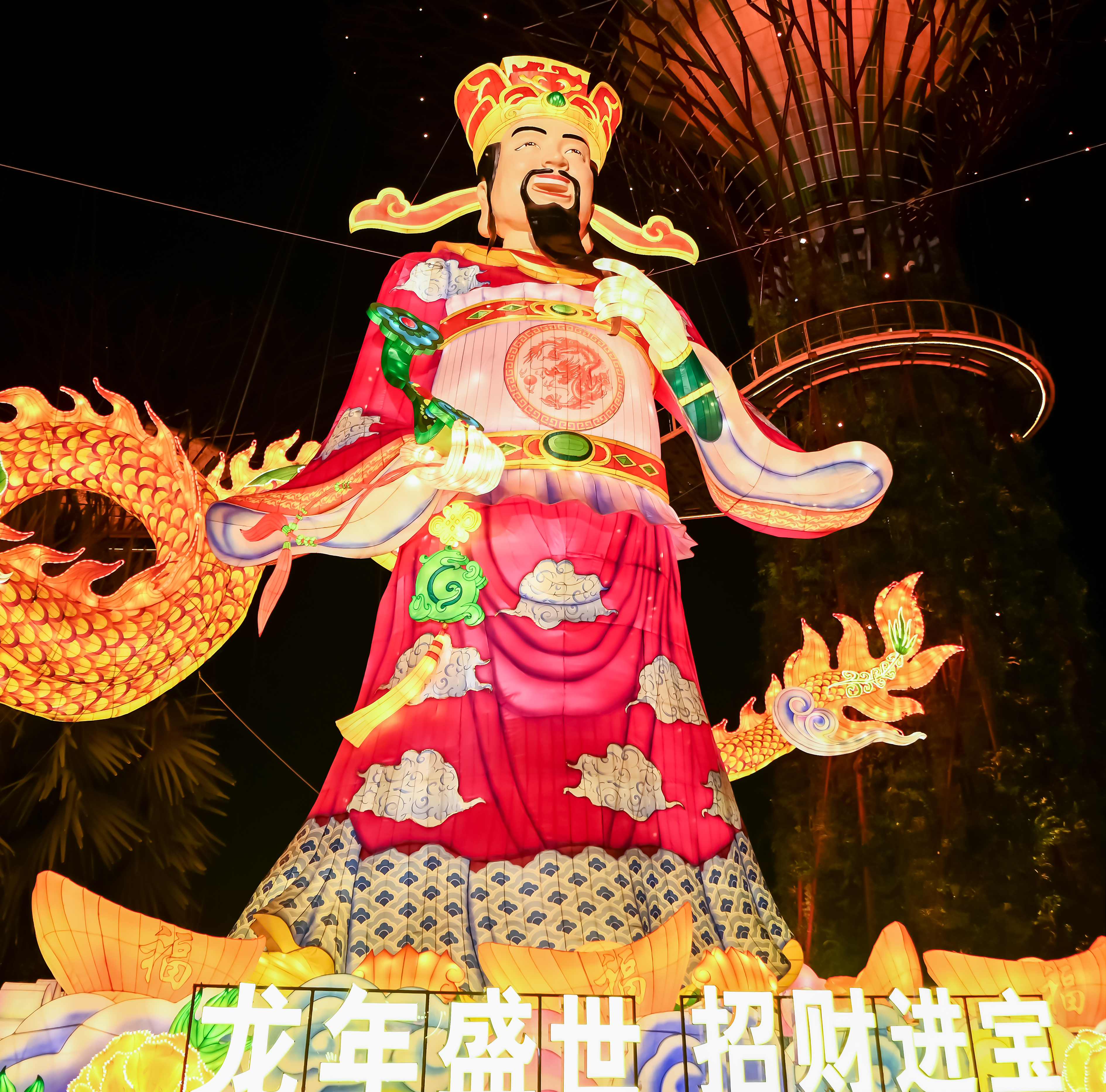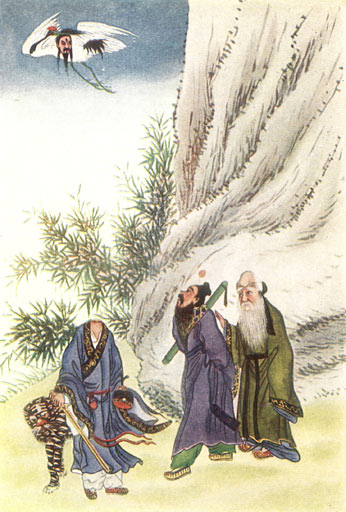|
Bigan
Prince Bigan (), surnamed " Zi" (子), was a prominent Chinese figure during the Shang dynasty. He was a son of King Wen Ding, and an uncle of King Zhou, and served as the Prime Minister of the Kingdom of Shang. He was later worshipped as the God of Wealth. History Prince Bigan was the prime minister of the Kingdom of Shang during the late Shang dynasty, and a member of the Shang royal family. His surname was " Zi" (子). He was the son of King Wen Ding and served his nephew, King Zhou. Zhou, the last king of the Shang dynasty, has been traditionally regarded as notoriously cruel, immoral, and wasteful. According to the account recorded by Sima Qian in his '' Records of the Grand Historian'', King Zhou's minister Prince Weizi admonished him to reform his ways several times, but his admonitions fell on deaf ears. Prince Weizi then decided to withdraw from the court, but Prince Bigan argued that to serve as minister meant doing what was right even if it meant death. Prince Bi ... [...More Info...] [...Related Items...] OR: [Wikipedia] [Google] [Baidu] |
Weizi Of Song
Weizi (), also spelled Wei Tsze, was the first ruler of Song. He was the subject of Chapter 18 of the ''Analects'' of Confucius. Weizi was the eldest son of Di Yi. He was first enfeoffed at Wei (微), hence Lord of Wei (微子). He was also a half-brother of the last Shang king, Di Xin (better known as King Zhou of Shang). Di Xin gave himself over to drinking, women and abandoned morals. Weizi tried to persuade him not to do so, but Di Xin ignored. Subsequently, Weizi resigned and withdrew from the court. When Zhou dynasty conquered the Shang kingdom, Weizi submitted and presented the ritual utensils to King Wu of Zhou. He was pardoned by King Wu. After Rebellion of the Three Guards was put down, Weizi was enfeoffed as Duke of Song and granted land at Shangqiu (商邱 'the hill of Shang'), where the capital of the new State of Song was built. After his death, he was succeeded by his younger brother Yan (衍), historically known as Weizhong (). Weizi was honored by Confuciu ... [...More Info...] [...Related Items...] OR: [Wikipedia] [Google] [Baidu] |
Zi (surname)
Zi (子) was the royal surname of the Kings of the Shang dynasty, originally from their ancestor named Xie (契). After the fall of the Shang and the rise of the Zhou dynasty, the royal family changed their surname to Yīn (殷), the name of their capital. Other names derived from Zi include Kong (孔), which was created by graphically combining “子” with “乙” Yi, from 太乙, the courtesy name of King Tang of Shang Cheng Tang (born Zi Lü), recorded on oracle bones as Tai Yi or Da Yi, was the first king of the Shang dynasty. Tang is traditionally considered a virtuous ruler, as signified by his common nickname Tang the Perfect. According to legend, as th .... In modern times, it was found to be the 413th-most common surname, shared by 110,000 people. Notable people * Bi Gan or Bigan (比干) was a prominent Chinese political figure during the Shang dynasty. References individual Chinese surnames {{Surname-stub ... [...More Info...] [...Related Items...] OR: [Wikipedia] [Google] [Baidu] |
Shang Dynasty
The Shang dynasty (), also known as the Yin dynasty (), was a Chinese royal dynasty that ruled in the Yellow River valley during the second millennium BC, traditionally succeeding the Xia dynasty and followed by the Western Zhou dynasty. The classic account of the Shang comes from texts such as the '' Book of Documents'', '' Bamboo Annals'' and '' Shiji''. Modern scholarship dates the dynasty between the 16th and 11th centuries BC, with more agreement surrounding the end date than beginning date. The Shang dynasty is the earliest dynasty within traditional Chinese history that is firmly supported by archaeological evidence. The archaeological site of Yinxu, near modern-day Anyang, corresponds to the final Shang capital of Yin. Excavations at Yinxu have revealed eleven major royal tombs, the foundations of former palace buildings, and the remains of both animals and humans that were sacrificed in official state rituals. Tens of thousands of bronze, jade, ... [...More Info...] [...Related Items...] OR: [Wikipedia] [Google] [Baidu] |
Jizi
Jizi, Qizi, or Kizi (; Gija or Kija in Korean language, Korean) was a semi-legendary * :"Although Kija may have truly existed as a historical figure, Tangun is more problematical." * :"Most [Korean historians] treat the [Tangun] myth as a later creation." * :"The Tangun myth became more popular with groups that wanted Korea to be independent; the Kija myth was more useful to those who wanted to show that Korea had a strong affinity to China." * :"If a choice is to be made between them, one is faced with the fact that the Tangun, with his supernatural origin, is more clearly a mythological figure than Kija." * :"An extreme manifestation of nationalism and the family cult was the revival of interest in Tangun, the mythical founder of the first Korean state... Most textbooks and professional historians, however, treat him as a myth." ancient China, Chinese sage who is said to have ruled Gija Joseon in the 11th century BCE. Early Chinese documents like the ''Book of Documents'' an ... [...More Info...] [...Related Items...] OR: [Wikipedia] [Google] [Baidu] |
Wei Zheng
Wei Zheng (580 – 11 February 643), courtesy name Xuancheng, posthumous name Duke Wenzhen of Zheng, was a Chinese politician and historian. He served as a chancellor of the Tang dynasty for about 13 years during the reign of Emperor Taizong. He was also the lead editor of the official history of the Sui dynasty, the '' Book of Sui'', which was composed in 636. Wei Zheng was born to a poor family in modern Hebei, and joined Li Mi's rebellion against the Sui dynasty in his youth. After Li Mi's submission to the Tang Empire, Wei Zheng became a Tang official and eventually served on the staff of Li Jiancheng, the Crown Prince and eldest son of Emperor Gaozu, the Tang dynasty's founding emperor. As such, he served against the interests of Li Jiancheng's younger brother, Li Shimin (the Prince of Qin), with whom Li Jiancheng was locked in an intense rivalry. In 626, Li Shimin ambushed and killed Li Jiancheng, and then effectively forced Emperor Gaozu to yield the throne to him. ... [...More Info...] [...Related Items...] OR: [Wikipedia] [Google] [Baidu] |
Daji
Daji ( zh, c=妲己, p=Dájǐ, w=Ta2-chi3) was the favourite consort of King Zhou of Shang, the last king of the Shang dynasty in ancient China. In legends and fictions, she is portrayed as a malevolent fox spirit who kills and impersonates the real Daji. Her identification as a fox spirit seems to have originated from at least the Tang dynasty. These accounts have been popularized in works such as the (), the , and the . She is considered a classic example of how a beautiful femme fatale can cause the downfall of a dynasty in Chinese culture. In the Song dynasty, fox spirit cults, including those dedicated to Daji, became outlawed, but their suppression was unsuccessful. For example, in 1111, an imperial edict was issued for the destruction of many spirit shrines within Kaifeng, including those of Daji. Biography Daji was from a noble family of Yousu (); her style name is Da (), and her clan name is Ji (). Hence, she is also known as Su Da Ji or Da Ji in ancient sources. At ... [...More Info...] [...Related Items...] OR: [Wikipedia] [Google] [Baidu] |
Caishen
Caishen () is the mythological figure worshipped in the Chinese folk religion and Taoism. He has been identified with many historical figures, viewed as his embodied forms, among whom Zhao Gongming (, Wade–Giles: ''Chao Kung-ming''; also known as Zhao Gong Yuanshuai "Lord Zhao the Marshal"), Fan Li, and Bi Gan. A large temple of Caishen was built in the 2000s in Zhouzhi, Xi'an, Shaanxi. Caishen's name is often invoked during the Chinese New Year celebrations. He is often depicted riding a black tiger and holding a golden rod. He may also be depicted with an iron tool capable of turning stone and iron into gold. Historical personages Several versions of Caishen's incarnations' political affiliation and way of deification are circulated. It is unclear whether they are genuine historical figures, though most of the stories agree that Caishen's most popular incarnation lived during the early Qin dynasty. Most probably it represents the merging of several heterogeneous le ... [...More Info...] [...Related Items...] OR: [Wikipedia] [Google] [Baidu] |
Ming Dynasty
The Ming dynasty, officially the Great Ming, was an Dynasties of China, imperial dynasty of China that ruled from 1368 to 1644, following the collapse of the Mongol Empire, Mongol-led Yuan dynasty. The Ming was the last imperial dynasty of China ruled by the Han people, the majority ethnic group in China. Although the primary capital of Beijing fell in 1644 to a rebellion led by Li Zicheng (who established the short-lived Shun dynasty), numerous rump state, rump regimes ruled by remnants of the House of Zhu, Ming imperial family, collectively called the Southern Ming, survived until 1662. The Ming dynasty's founder, the Hongwu Emperor (1368–1398), attempted to create a society of self-sufficient rural communities ordered in a rigid, immobile system that would guarantee and support a permanent class of soldiers for his dynasty: the empire's standing army exceeded one million troops and the naval history of China, navy's dockyards in Nanjing were the largest in the world. H ... [...More Info...] [...Related Items...] OR: [Wikipedia] [Google] [Baidu] |
Jiang Ziya
Jiang Ziya ( century BC – 11th century BC), also known by several other names, also known by his posthumous name as the Duke Tai of Qi, was the founding monarch of the Qi state. He was a military general and strategist who assisted King Wen of Zhou and King Wu of Zhou overthrow the Shang dynasty and establish the Zhou dynasty. Following their victory in the Battle of Muye, he continued to serve as a Zhou minister. He remained loyal to the regent Ji Dan (Duke Wen of Zhou) during the Rebellion of the Three Guards; following the Ji Dan's punitive raids against the restive Dongyi, Jiang was enfeoffed with the land of Qi. He established his seat at Yingqiu (in modern-day Linzi, Zibo, Shandong). He has been worshipped as a war god since the Han and, especially, Tang dynasties. He is also celebrated in Chinese literature, and is one of the main heroes in the Ming-era ''Investiture of the Gods''. Names The first ruler of Qi bore the given name Shang. The nobi ... [...More Info...] [...Related Items...] OR: [Wikipedia] [Google] [Baidu] |
The Investiture Of The Gods
''The Investiture of the Gods'', also known by its Chinese titles () and is a 16th-century Chinese novel and one of the major vernacular Chinese works in the gods and demons (''shenmo'') genre written during the Ming dynasty (1368–1644). Consisting of 100 chapters, it was first published in book form between 1567 and 1619. Another source claims it was published in a finalized edition in 1605. The work combines elements of history, folklore, mythology, legends and fantasy.Chew, Katherine Liang (2002). ''Tales of the Teahouse Retold: Investiture of the Gods''. Page XI. . The story is set in the era of the decline of the Shang dynasty (1600–1046 BC) and the rise of the Zhou dynasty (1046–256 BC). It intertwines numerous elements of Chinese mythology, Chinese folk religion, Chinese Buddhism, Confucianism, and Taoism, including deities, demons, immortals and spirits. The authorship is attributed to Xu Zhonglin. Plot The novel is a romanticised retelling of the ... [...More Info...] [...Related Items...] OR: [Wikipedia] [Google] [Baidu] |





